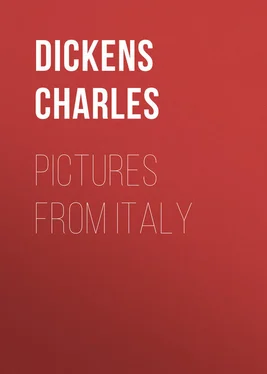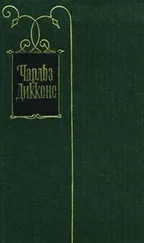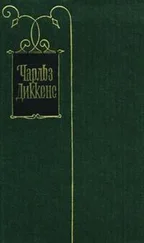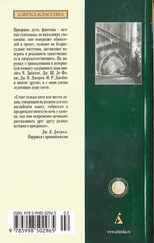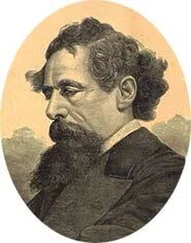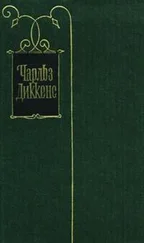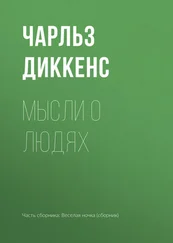Чарльз Диккенс - Pictures from Italy
Здесь есть возможность читать онлайн «Чарльз Диккенс - Pictures from Italy» — ознакомительный отрывок электронной книги совершенно бесплатно, а после прочтения отрывка купить полную версию. В некоторых случаях можно слушать аудио, скачать через торрент в формате fb2 и присутствует краткое содержание. Жанр: foreign_antique, foreign_prose, на английском языке. Описание произведения, (предисловие) а так же отзывы посетителей доступны на портале библиотеки ЛибКат.
- Название:Pictures from Italy
- Автор:
- Жанр:
- Год:неизвестен
- ISBN:нет данных
- Рейтинг книги:5 / 5. Голосов: 1
-
Избранное:Добавить в избранное
- Отзывы:
-
Ваша оценка:
- 100
- 1
- 2
- 3
- 4
- 5
Pictures from Italy: краткое содержание, описание и аннотация
Предлагаем к чтению аннотацию, описание, краткое содержание или предисловие (зависит от того, что написал сам автор книги «Pictures from Italy»). Если вы не нашли необходимую информацию о книге — напишите в комментариях, мы постараемся отыскать её.
Pictures from Italy — читать онлайн ознакомительный отрывок
Ниже представлен текст книги, разбитый по страницам. Система сохранения места последней прочитанной страницы, позволяет с удобством читать онлайн бесплатно книгу «Pictures from Italy», без необходимости каждый раз заново искать на чём Вы остановились. Поставьте закладку, и сможете в любой момент перейти на страницу, на которой закончили чтение.
Интервал:
Закладка:
We have four horses, and one postilion, who has a very long whip, and drives his team, something like the Courier of Saint Petersburgh in the circle at Astley’s or Franconi’s: only he sits his own horse instead of standing on him. The immense jack-boots worn by these postilions, are sometimes a century or two old; and are so ludicrously disproportionate to the wearer’s foot, that the spur, which is put where his own heel comes, is generally halfway up the leg of the boots. The man often comes out of the stable-yard, with his whip in his hand and his shoes on, and brings out, in both hands, one boot at a time, which he plants on the ground by the side of his horse, with great gravity, until everything is ready. When it is – and oh Heaven! the noise they make about it! – he gets into the boots, shoes and all, or is hoisted into them by a couple of friends; adjusts the rope harness, embossed by the labours of innumerable pigeons in the stables; makes all the horses kick and plunge; cracks his whip like a madman; shouts ‘En route – Hi!’ and away we go. He is sure to have a contest with his horse before we have gone very far; and then he calls him a Thief, and a Brigand, and a Pig, and what not; and beats him about the head as if he were made of wood.
There is little more than one variety in the appearance of the country, for the first two days. From a dreary plain, to an interminable avenue, and from an interminable avenue to a dreary plain again. Plenty of vines there are in the open fields, but of a short low kind, and not trained in festoons, but about straight sticks. Beggars innumerable there are, everywhere; but an extraordinarily scanty population, and fewer children than I ever encountered. I don’t believe we saw a hundred children between Paris and Chalons. Queer old towns, draw-bridged and walled: with odd little towers at the angles, like grotesque faces, as if the wall had put a mask on, and were staring down into the moat; other strange little towers, in gardens and fields, and down lanes, and in farm-yards: all alone, and always round, with a peaked roof, and never used for any purpose at all; ruinous buildings of all sorts; sometimes an hôtel de ville, sometimes a guard-house, sometimes a dwelling-house, sometimes a château with a rank garden, prolific in dandelion, and watched over by extinguisher-topped turrets, and blink-eyed little casements; are the standard objects, repeated over and over again. Sometimes we pass a village inn, with a crumbling wall belonging to it, and a perfect town of out-houses; and painted over the gateway, ‘Stabling for Sixty Horses;’ as indeed there might be stabling for sixty score, were there any horses to be stabled there, or anybody resting there, or anything stirring about the place but a dangling bush, indicative of the wine inside: which flutters idly in the wind, in lazy keeping with everything else, and certainly is never in a green old age, though always so old as to be dropping to pieces. And all day long, strange little narrow waggons, in strings of six or eight, bringing cheese from Switzerland, and frequently in charge, the whole line, of one man, or even boy – and he very often asleep in the foremost cart – come jingling past: the horses drowsily ringing the bells upon their harness, and looking as if they thought (no doubt they do) their great blue woolly furniture, of immense weight and thickness, with a pair of grotesque horns growing out of the collar, very much too warm for the Midsummer weather.
Then, there is the Diligence, twice or thrice a-day; with the dusty outsides in blue frocks, like butchers; and the insides in white nightcaps; and its cabriolet head on the roof, nodding and shaking, like an idiot’s head; and its Young-France passengers staring out of window, with beards down to their waists, and blue spectacles awfully shading their warlike eyes, and very big sticks clenched in their National grasp. Also the Malle Poste, with only a couple of passengers, tearing along at a real good dare-devil pace, and out of sight in no time. Steady old Curés come jolting past, now and then, in such ramshackle, rusty, musty, clattering coaches as no Englishman would believe in; and bony women dawdle about in solitary places, holding cows by ropes while they feed, or digging and hoeing or doing field-work of a more laborious kind, or representing real shepherdesses with their flocks – to obtain an adequate idea of which pursuit and its followers, in any country, it is only necessary to take any pastoral poem, or picture, and imagine to yourself whatever is most exquisitely and widely unlike the descriptions therein contained.
You have been travelling along, stupidly enough, as you generally do in the last stage of the day; and the ninety-six bells upon the horses – twenty-four apiece – have been ringing sleepily in your ears for half an hour or so; and it has become a very jog-trot, monotonous, tiresome sort of business; and you have been thinking deeply about the dinner you will have at the next stage; when, down at the end of the long avenue of trees through which you are travelling, the first indication of a town appears, in the shape of some straggling cottages: and the carriage begins to rattle and roll over a horribly uneven pavement. As if the equipage were a great firework, and the mere sight of a smoking cottage chimney had lighted it, instantly it begins to crack and splutter, as if the very devil were in it. Crack, crack, crack, crack. Crack-crack-crack. Crick-crack. Crick-crack. Helo! Hola! Vite! Voleur! Brigand! Hi hi hi! En r-r-r-r-r-route! Whip, wheels, driver, stones, beggars, children, crack, crack, crack; helo! hola! charité pour l’amour de Dieu! crick-crack-crick-crack; crick, crick, crick; bump, jolt, crack, bump, crick-crack; round the corner, up the narrow street, down the paved hill on the other side; in the gutter; bump, bump; jolt, jog, crick, crick, crick; crack, crack, crack; into the shop-windows on the left-hand side of the street, preliminary to a sweeping turn into the wooden archway on the right; rumble, rumble, rumble; clatter, clatter, clatter; crick, crick, crick; and here we are in the yard of the Hôtel de l’Ecu d’Or; used up, gone out, smoking, spent, exhausted; but sometimes making a false start unexpectedly, with nothing coming of it – like a firework to the last!
The landlady of the Hôtel de l’Ecu d’Or is here; and the landlord of the Hôtel de l’Ecu d’Or is here; and the femme de chambre of the Hôtel de l’Ecu d’Or is here; and a gentleman in a glazed cap, with a red beard like a bosom friend, who is staying at the Hôtel de l’Ecu d’Or, is here; and Monsieur le Curé is walking up and down in a corner of the yard by himself, with a shovel hat upon his head, and a black gown on his back, and a book in one hand, and an umbrella in the other; and everybody, except Monsieur le Curé, is open-mouthed and open-eyed, for the opening of the carriage-door. The landlord of the Hôtel de l’Ecu d’Or, dotes to that extent upon the Courier, that he can hardly wait for his coming down from the box, but embraces his very legs and boot-heels as he descends. ‘My Courier! My brave Courier! My friend! My brother!’ The landlady loves him, the femme de chambre blesses him, the garçon worships him. The Courier asks if his letter has been received? It has, it has. Are the rooms prepared? They are, they are. The best rooms for my noble Courier. The rooms of state for my gallant Courier; the whole house is at the service of my best of friends! He keeps his hand upon the carriage-door, and asks some other question to enhance the expectation. He carries a green leathern purse outside his coat, suspended by a belt. The idlers look at it; one touches it. It is full of five-franc pieces. Murmurs of admiration are heard among the boys. The landlord falls upon the Courier’s neck, and folds him to his breast. He is so much fatter than he was, he says! He looks so rosy and so well!
Читать дальшеИнтервал:
Закладка:
Похожие книги на «Pictures from Italy»
Представляем Вашему вниманию похожие книги на «Pictures from Italy» списком для выбора. Мы отобрали схожую по названию и смыслу литературу в надежде предоставить читателям больше вариантов отыскать новые, интересные, ещё непрочитанные произведения.
Обсуждение, отзывы о книге «Pictures from Italy» и просто собственные мнения читателей. Оставьте ваши комментарии, напишите, что Вы думаете о произведении, его смысле или главных героях. Укажите что конкретно понравилось, а что нет, и почему Вы так считаете.
